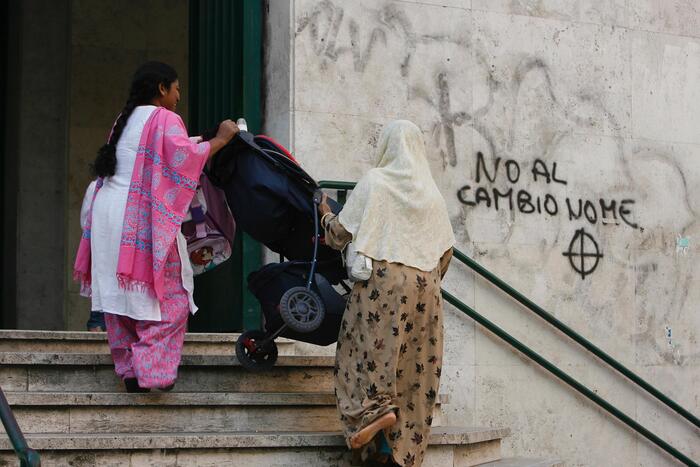SPIEGEL: Young Muslim men have a bad reputation in Germany. Are they being wronged?
Toprak: Thank you. But some boys use this reputation pretty well, because they behave badly in public, for example, they queue up in groups or behave like misogynist machos. Clichés often do not arise out of the blue. For some groups of young Muslim men, there are significant problems in schools, but also in their law-abiding behavior.
SPIEGEL: What explanation do you have for this?
Toprak: For the success or failure of integration, I am primarily responsible for parenting and parenting. They are the macho makers.
SPIEGEL: What's wrong with that?
Toprak: In many strictly conservative Muslim families, parents are all about preparing their sons to become the head. They should later represent the family, protect and feed.
SPIEGEL: How did you imagine that?
Toprak: A boy may, in contrast to the girls out, should explore the world, try out, learn from other men. And very important: he is allowed to make mistakes. If he contradicts his mother, that's no problem.
SPIEGEL: And a girl ...
Toprak: ... should be a decent housewife. It has to be based on the mother and should imitate it. A girl is not allowed to make any mistakes, otherwise the mother will make rubatz. The daughter must be disciplined, tidy, reliable and organized in everything she does. Everything is geared towards being a good wife and mother early on. By the way, unlike her brother, she can not contradict her mother. This outdated gender vision is one of the biggest problems for integration.
SPIEGEL: The expectation of the children seems to be enormous. How does that affect the boys?
Toprak: In Germany, some of them have to slip into the role of a strong man much sooner than they do good. According to tradition, the father supposedly remains the authoritarian authority. In reality, however, many fathers are unemployed or do not speak German well in a given environment. They rarely fulfill their role model function well. In the worst case, even though their beliefs forbid them, they turned to gambling or alcohol. The sons have to fill in the gaps.
SPIEGEL: During your time as a social worker, you worked a lot with difficult Muslim adolescents. Can you describe an example from practice?
Toprak: That's where Fatih, a 17-year-old boy with Kurdish roots, comes to mind. Together with his mother, he and a colleague and I got advice from the juvenile court assistant because he had been charged with minor offenses. We noticed from the beginning how badly the boy treated his mother.
SPIEGEL: To what extent?
Toprak: He was a picture-book macho. Women had nothing to say in his eyes. He kept rolling his eyes and saying things like "Mom, shut up".
SPIEGEL: How did you react?
Toprak: My colleague intervened very resolutely and said, "Listen, how are you talking to your mother, you have to show more respect!" I then made it clear to him that we would not allow such behavior in the consultation. "If you do not follow the rules, you can go home right away."
SPIEGEL: How did he react?
Toprak: He apologized. Suddenly, this physically very big boy became very small. He had tears in his eyes. Such a reaction, even from a woman, seemed to him completely unexpected. When we talked to the young mother afterwards, she told us the family story. She had Fatih at the age of eighteen. The boy's father had left the two when Fatih was 13 years old. From then on, the boy was the head of the family. He was the determiner. At no time did the mother make him feel like she was capable of being the adult mistress. She should have treated her child like a thirteen-year-old, with the appropriate freedoms and limits.
SPIEGEL: What meaning do you attach especially to mothers in education?
Toprak: The fathers are often rarely at home and take little responsibility for the children. The bulk of the work is therefore on the shoulders of the mothers. Unfortunately, they make many mistakes. They believe they need to protect and shield their sons in every situation. They become furies when their sons are criticized or attacked by evil teachers, for example, or social workers. The boys have no chance at all to reflect and become independent. They rarely feel consequences if they misbehave. You can not be expected too much, no housework, for example. The sons are cherished and cared for until they come into the experienced hands of a wife.
SPIEGEL: How should boys from such families get along in school?
Toprak: Most of the Muslim boys know that the rabbit runs differently at school than in the family. And accept that too. One part, however, does not always manage to change. Those who think that they are allowed to allow themselves everything at home and belong to the supposedly superior sex, that also applies in the classroom.
SPIEGEL: What do you advise teachers who are dealing with such adolescents?
Toprak: You have to make it very clear to the class which rules apply in school and that they have the say. If you do not stick to it, you have to get into trouble. A big mistake would be, for example, to get a man to reinforce. That would be the absolutely wrong signal and would only encourage the guys in their worldview. Incidentally, I would never say something like, "I know that's different in your culture." That does not matter and relativizes the misconduct. You should tell the boy clearly where to go.
SPIEGEL: You yourself were born in a central Anatolian village. Her family lived there from agriculture and livestock. In 1969, her father moved to Germany as a guest worker, followed by her mother a year later, and not until 1980 did she catch up. In your book, you write that your parents were also very traditional at first but opened up over time. What made the difference?
Toprak: In the beginning my parents thought they would go back to Turkey. For a long time, they also stuck to the values and old gender roles that were in our home village. When it was clear that we would stay in Germany, that has changed. My parents did not have to prove or live up to anyone in Turkey. That changed everything.
SPIEGEL: At this point, however, there were many Turkish families in Germany in the eighties. Were there other reasons for the change in the Topraks?
Toprak: My parents have always been pragmatic. It was important to them that their children succeed. Over time they realized that you can do much better in Germany, if you break away from the old and traditional ideas, they have just done it.
SPIEGEL: You write that your mother even took off her headscarf. A drastic step?
Price query time:
18.10.2019, 10:04 clock
No guarantee
DISPLAY
Prof. Dr. Ahmet Toprak
Muslim, male, disintegrated: What goes wrong with the education of Muslim boys
Publishing company:
Econ
Pages:
240
Price:
EUR 18,00
Buy from Amazon Buy from Thalia
Product information is purely editorial and independent. The so-called affiliate links above, we usually receive a commission from the dealer when buying. More information here.
Toprak: It was not for my mother. She wore the headscarf only because it was so common in the country and not on religious grounds. You could also see her hairline under the loosely curved cloth. I know a picture of my mother wearing a mini skirt and a headscarf. We are Alevis, but our family has never been very religious.
SPIEGEL: Is religion often a barrier to integration?
Toprak: I'm convinced of that now. Certainly you can be religious and integrated, as far as you have to differentiate. But once parents subordinate everything in the life of religion, it becomes a problem.
SPIEGEL: How can that be expressed?
Toprak: If the girls are not allowed to swim lessons or the class trip is taboo. And also, if the Koran school is taken too important. When the benefits count more than those at school. Many mosque associations are not exactly inclusive. Some even demand that their parishioners do not conform. Since the children would be better off in my view in the sports club.









